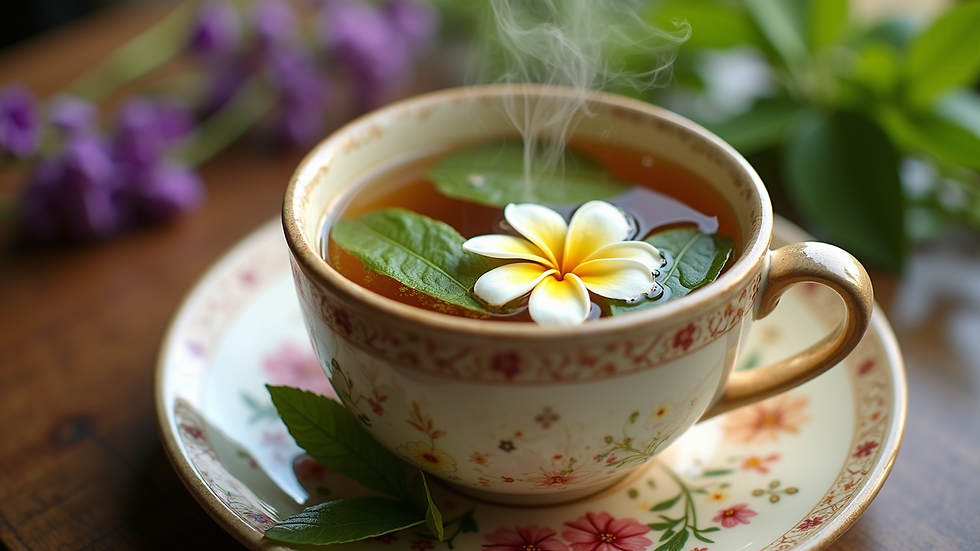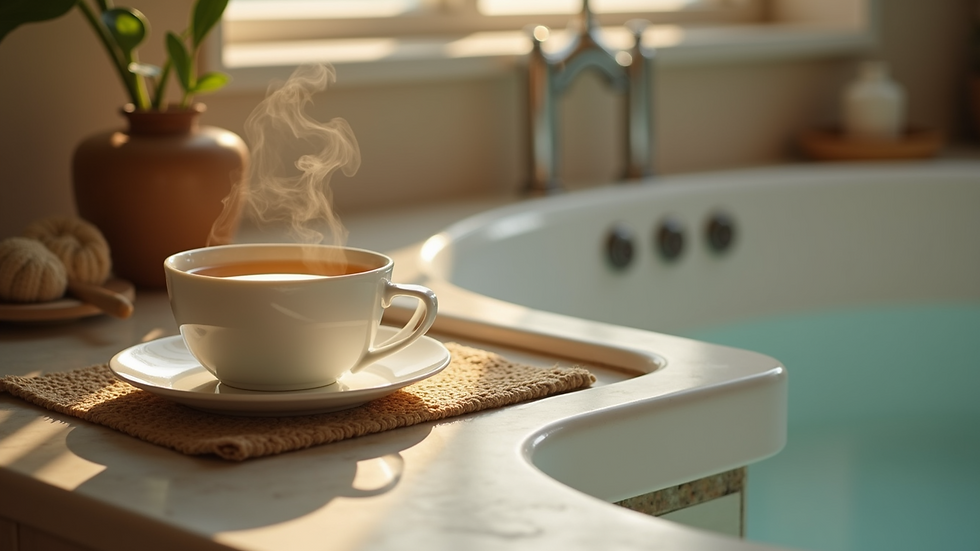Harnessing Herbal Tea for Holistic Wellness
- Prairie Holistic
- Sep 19
- 5 min read
In today's fast-paced world, many people are seeking natural ways to enhance their well-being. One delightful and soothing option is herbal tea. This ancient beverage not only warms the soul but also offers a range of health benefits. From calming anxiety to boosting immunity, herbal tea can be a powerful ally in your journey toward holistic wellness.
Herbal tea is made from a variety of plants, including leaves, flowers, seeds, and roots. Unlike traditional tea, which comes from the Camellia sinensis plant, herbal tea can be caffeine-free and packed with unique flavors and health benefits. In this post, we will explore the different types of herbal teas, their benefits, and how to incorporate them into your daily routine.
The Benefits of Herbal Tea
Herbal tea is more than just a comforting drink. It can provide numerous health benefits, making it a great addition to your wellness routine. Here are some of the key benefits:
Stress Relief: Many herbal teas, such as chamomile and lavender, are known for their calming properties. They can help reduce stress and promote relaxation.
Digestive Health: Herbal teas like peppermint and ginger can aid digestion and soothe an upset stomach. They can also help alleviate bloating and gas.
Immune Support: Herbal teas made from ingredients like echinacea and elderberry can boost your immune system, helping you fend off colds and flu.
Anti-Inflammatory Properties: Teas such as turmeric and rooibos contain antioxidants that can help reduce inflammation in the body.
Improved Sleep: Herbal teas like valerian root and passionflower can promote better sleep quality, making them ideal for those struggling with insomnia.
Popular Herbal Teas and Their Uses
With so many herbal teas available, it can be overwhelming to choose the right one for your needs. Here are some popular options and their specific benefits:
Chamomile Tea
Chamomile tea is well-known for its calming effects. It can help reduce anxiety and promote better sleep. Drinking a cup before bedtime can help you unwind and prepare for a restful night.
Peppermint Tea
Peppermint tea is refreshing and invigorating. It can help relieve digestive issues and ease headaches. The menthol in peppermint can also provide a cooling sensation, making it a great choice for hot days.
Ginger Tea
Ginger tea is a warming beverage that can help with nausea and digestive discomfort. It is also known for its anti-inflammatory properties, making it a good choice for those with joint pain.
Hibiscus Tea
Hibiscus tea has a tart flavor and is rich in antioxidants. It can help lower blood pressure and support heart health. Plus, its vibrant red color makes it visually appealing.
Rooibos Tea
Rooibos tea is caffeine-free and packed with antioxidants. It can help improve skin health and reduce inflammation. Its naturally sweet flavor makes it a great alternative to sugary drinks.
How to Brew the Perfect Cup of Herbal Tea
Brewing herbal tea is simple, but there are a few tips to ensure you get the most flavor and benefits from your tea:
Choose Quality Ingredients: Look for high-quality loose-leaf tea or tea bags. Fresh herbs can also be used for a more potent flavor.
Use the Right Water Temperature: Different herbs require different water temperatures. Generally, boiling water is best for most herbal teas, but delicate flowers like chamomile may benefit from slightly cooler water.
Steep for the Right Time: Steeping time can vary. Most herbal teas should steep for 5 to 10 minutes to extract the full flavor and benefits.
Experiment with Additions: Feel free to add honey, lemon, or spices to enhance the flavor of your tea. Each addition can also bring its own health benefits.
Enjoy Mindfully: Take a moment to savor the aroma and flavor of your tea. This mindfulness can enhance your overall experience and promote relaxation.
Incorporating Herbal Tea into Your Daily Routine
Making herbal tea a part of your daily routine can be easy and enjoyable. Here are some practical ways to do so:
Morning Ritual: Start your day with a cup of ginger or peppermint tea to kickstart your digestion and energize your morning.
Afternoon Break: Take a break in the afternoon with a calming cup of chamomile or hibiscus tea. This can help you recharge and refocus.
Evening Wind Down: Create a bedtime routine by sipping on valerian root or lavender tea. This can signal to your body that it is time to relax and prepare for sleep.
Social Gatherings: Serve herbal tea at gatherings instead of sugary drinks. It can be a unique and healthy option for your guests.
DIY Blends: Experiment with creating your own herbal tea blends. Combine different herbs to find flavors that you love.
Herbal Tea and Holistic Wellness
Herbal tea is not just a drink; it is a holistic approach to wellness. By incorporating herbal tea into your life, you can support your physical, mental, and emotional health. Here are some ways herbal tea aligns with holistic wellness:
Mind-Body Connection: The act of brewing and sipping tea can be a meditative practice. It encourages mindfulness and helps you connect with your body.
Natural Remedies: Herbal teas can serve as natural remedies for common ailments, reducing the need for over-the-counter medications.
Nutritional Benefits: Many herbal teas are rich in vitamins, minerals, and antioxidants, contributing to overall health.
Community and Connection: Sharing tea with friends and family can strengthen bonds and create a sense of community.
A World of Herbal Tea
The world of herbal tea is vast and diverse. Each culture has its own unique herbal blends and traditions. Exploring these can deepen your appreciation for this ancient beverage. Here are a few examples:
Chinese Herbal Teas: Traditional Chinese medicine often incorporates herbal teas for healing. Ingredients like goji berries and ginseng are commonly used.
Indian Chai: Indian chai is a spiced tea that combines black tea with various herbs and spices. It is often enjoyed with milk and sugar.
Japanese Herbal Teas: Japan has a rich tea culture, with herbal options like mugicha (barley tea) being popular for its refreshing taste.
Middle Eastern Mint Tea: In many Middle Eastern countries, mint tea is a staple. It is often served sweetened and is a symbol of hospitality.
The Future of Herbal Tea
As more people seek natural and holistic approaches to health, the popularity of herbal tea continues to grow. New blends and flavors are emerging, catering to diverse tastes and health needs. Whether you are a seasoned herbal tea drinker or just starting, there is always something new to discover.
Incorporating herbal tea into your wellness routine can be a simple yet effective way to enhance your health. With its numerous benefits and delightful flavors, herbal tea is a wonderful addition to any lifestyle.
So, why not brew a cup today? Embrace the warmth and comfort of herbal tea, and let it guide you on your journey to holistic wellness.



Comments